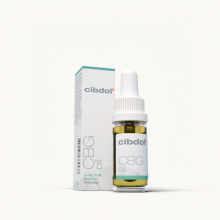Does CBG give you a buzz?
Published:
As interest grows in the therapeutic potential of cannabis compounds like CBD, another cannabinoid called CBG is also garnering attention. Some anecdotal reports suggest CBG may produce a noticeable “buzz”. But is there any truth to these claims? Or is CBG non-intoxicating like CBD? Here’s a comprehensive look at the evidence.
Contents:
- What is CBG?
- Does CBG Produce a High?
- Anecdotal Reports of A CBG Buzz
- Potential Explanations for Perceived CBG Buzz
- Scientific Research on CBG’s Effects on Mood
- Evaluating CBG’s Mental Effects
- Key Factors That May Influence Effects
- Is The CBG Buzz Enjoyable or Problematic?
- Using CBG Responsibly and Safely
- CBG and psychoactivity
- Frequently Asked Questions
- Does CBG give you a buzz? Conclusion
- Resources used to write this article

What is CBG?
First, let’s cover some background on what CBG is exactly:
- CBG stands for cannabigerol.
- It is a non-psychoactive cannabinoid found in cannabis plants.
- CBG is actually the precursor from which THC and CBD are synthesized during plant growth.
- It interacts with the human endocannabinoid system to produce various effects.
- Research shows CBG has promising anti-inflammatory, neuroprotective, and analgesic properties.
So while related to the psychoactive cannabinoid THC, CBG itself is not known to be intoxicating based on its distinct chemical structure and pharmacological profile. But does it produce any subtle mental effects?
Does CBG Produce a High?
The primary reason researchers believe CBG does not cause a euphoric high is because:
- It has low binding affinity for CB1 receptors in the brain. THC produces its classic high by strongly activating CB1 receptors.
- CBG demonstrates poor penetration across the blood-brain barrier. This limits its central nervous system effects.
- Animal studies show CBG does not substitute for THC in drug discrimination assays. This suggests it does not cause perceptual changes.
- Human trials report no intoxicating effects from CBG even at high doses. Participants describe neutral mental effects.
So while not definitively proven, current evidence strongly implies CBG in isolation does not induce psychoactive effects or cognitive impairment the way THC does. But what about more subtle subjective “buzzing” that some users describe?
Anecdotal Reports of A CBG Buzz
While scientific studies suggest CBG should not cause psychotropic effects, some anecdotal self-reports indicate otherwise:
- Some recreational cannabis users claim combining CBG with THC enhances their high.
- A subset describe perceiving mild mood lifting or stimulation from CBG alone.
- Certain individuals report feeling somewhat more focused, clear-headed, or energetic after taking CBG.
- Those with anxiety say higher CBG doses can produce jitteriness or increased heart rate.
- Claims surface online of CBG eliciting mild euphoria, talkativeness, or laughter.
What might account for these purported CBG effects despite a lack of supporting pharmacological data?
Potential Explanations for Perceived CBG Buzz
There are several potential explanations for why some people report sensing buzz-like effects from supplemental CBG while scientific literature states it is non-intoxicating:
- Placebo effect – Expectations of benefits can produce psychosomatic effects, especially with cannabis products. The power of suggestion should not be underestimated.
- Entourage effect – While not intoxicating alone, CBG may interact with other plant compounds still present in extracts to influence subjective effects.
- Synergistic mechanisms – CBG may enhance signaling of the brain’s naturally produced endocannabinoids, indirectly altering mood.
- Individual variability – A small subset of people may metabolize or respond to CBG differently based on genetics, physiology, etc.
- Inaccurate reporting – Online anecdotes are not scientifically reliable and may be exaggerated or misattributed. Controlled studies are needed.
So while CBG alone is unlikely to cause a buzz based on current pharma data, there are some plausible explanations for why a small portion of users anecdotally report otherwise. But what does the science actually say about CBG’s mental effects?
Scientific Research on CBG’s Effects on Mood
While human trials specifically investigating CBG’s mental effects are still limited, here are some relevant findings:
- Acute anxiety studies – Single doses of CBG reduce anxiety but do notcause subjective intoxication or impairment on cognitive tests.
- Chronic pain trials – When taken daily over weeks for pain, CBG improves mood and sleep without mental side effects.
- Rodent studies – CBG demonstrates antidepressant and anxiolytic effects in animal models without landing on drug discrimination tests.
- Safety data – High CBG doses taken for months elicit no reports of sedative, stimulating, or euphoric effects.
- Consumer surveys – The majority of individuals using supplemental CBG for health reasons report neutral mental effects, with only a minority noticing stimulation.
So while scientific analysis indicates CBG alone has negligible subjective or intoxicating effects, a fuller picture emerges when synthesizing preclinical, clinical, and anecdotal data.
Evaluating CBG’s Mental Effects
Taken as a whole, here is how experts conceptualize CBG’s effects on mood and cognition:
- No intoxication – CBG does not directly cause sedation, stimulation, euphoria, or cognitive impairment the way THC and other intoxicants do.
- Anxiolysis – CBG reduces baseline anxiety which could indirectly improve mood and focus by minimizing stress.
- Pain relief – Lessening of discomfort may also indirectly enhance mental state.
- Modest alertness – For some individuals, lower anxiety may manifest as feeling more energetic, activated, or upbeat.
- Placebo component – Expectations alone may produce mild subjective psychoactivity.
So while CBG should not cause overt intoxication, for a subset of users its subtle anxiolytic and analgesic properties could indirectly elicit buzz-adjacent effects by optimizing mental state. The degree varies based on individual differences.
Key Factors That May Influence Effects
Assuming CBG itself does not directly cause psychotropic effects, here are some key factors that can modulate its subjective actions:
- Dose – Higher CBG doses increase probability of inadvertently activating off-target receptors and transporters.
- Frequency of use – Chronic daily CBG use may alter endocannabinoid tone over time indirectly influencing mood.
- ** Route of administration** – Inhaled or sublingual CBG may cross the blood-brain barrier more readily than ingestion.
- Individual variation – Persons with endocannabinoid deficits could be more responsive. Genetics play a role.
- Presence of THC – Even tiny THC amounts could interacting with CBG to influence effects.
So CBG itself may not cause a buzz directly, but other considerations could lead to increased likelihood of perceiving psychoactivity in susceptible individuals under certain conditions.
Is The CBG Buzz Enjoyable or Problematic?
Assuming some people do notice subtle stimulation or changes from CBG – is this concerning or potentially beneficial?
On the positive side:
- Many welcome the mood-enhancing and anxiety-reducing properties of CBG.
- The mild clarity and focus some experience may benefit creativity and productivity.
- CBG may activate underactive endocannabinoid systems and correct deficiencies.
Potential downsides:
- Those prone to anxiety could find overstimulation from higher CBG doses.
- Interactions with medications that increase serotonin are possible.
- The “buzz” could indicate unintended off-target binding not fully characterized yet.
Overall, the low risk profile of CBG makes neuropsychiatric side effects unlikely. But subjective responses warrant more study to better understand individual differences in effects.
Using CBG Responsibly and Safely
If trying CBG yourself, here are some tips for staying safe and assessing your personal response:
- Consult your doctor – Disclose any mental health conditions or medications to screen for contraindications.
- Start low and go slow – Use minimal doses at first to gauge effects before increasing.
- Monitor mood changes – Keep a journal to map how CBG makes you feel over hours and days.
- Be wary of drug interactions – CBG may inhibit certain liver enzymes so could interact with antidepressants, benzodiazepines, and other psychoactive drugs.
- Avoid THC products – Seek broad or full spectrum extracts lower in THC to isolate CBG effects.
- Take planned breaks - Cycle off CBG for several days periodically to discern if tolerance or dependence develops.
Paying close attention to your individual response to supplemental CBG will enable you to use it in a safe, responsible manner.
CBG and psychoactivity
In summary, here are the key conclusions that can be drawn regarding whether CBG causes a buzz or high feeling:
- Scientific research indicates CBG alone should not directly cause intoxicating effects or cognitive impairment based on its pharmacology.
- However, a subset of anecdotal reports describe mild stimulating or euphoric effects from CBG use.
- Proposed explanations include the entourage effect, placebo response, and indirect mood enhancement from anxiolysis.
- While not intoxicating per se, CBG may optimize mental state in some users by reducing anxiety, improving focus, and activating deficient endocannabinoid signaling.
- Individual differences in dose response, metabolism, genetics, and neurochemistry likely mediate variabilities in subjective effects.
- Judicious CBG use is likely safe for most, but those predisposed to anxiety or taking serotonin medications warrant caution.
In conclusion, while CBG itself does not appear to be psychoactive, a constellation of indirect effects may elicit buzz-like subjective changes in mood, energy, and cognition for some people under certain conditions.
Frequently Asked Questions
Can CBG cause you to fail a drug test?
No, CBG products derived from hemp containing less than 0.3% THC should not cause a positive drug test result. However, false positives are possible with cheap tests, so check with your employer.
Is the CBG buzz more like sativas or indicas?
Some describe the mental effects of CBG more akin to stimulating sativa varieties of cannabis rather than relaxing indicas. However, scientifically CBG is neither since it does not contain THC which differentiates sativa vs indica highs.
What dose of CBG causes a buzz?
No standardized threshold exists as effects are highly individualized. But users anecdotally report needing upwards of 50-100mg CBG to potentially perceive anything resembling a buzz, while lower doses are usually neutral or calming.
Is the CBG high anxiety-inducing?
In most people CBG reduces baseline anxiety which is calming. But high doses could paradoxically worsen anxiety in those predisposed. Starting low and finding your optimal dose can prevent this.
Can I take CBG without worrying about drug tests?
Broad spectrum CBG products that filter out THC to non-detectable levels will not cause failed drug tests. But full spectrum extracts with minute THC traces may show up on sensitive tests at high enough doses. Know your source.
Does CBG give you a buzz? Conclusion
According to current pharmacological understanding, the non-intoxicating cannabinoid CBG should not cause psychoactive effects or cognitive impairment. However, a subset of users anecdotally report mood-enhancing and mildly stimulating qualities, likely attributable to indirect factors like anxiety reduction. While not intoxicating per se, CBG appears safe for most when used judiciously. But individual differences exist in dose response and susceptibility to subjective effects. Starting slowly and tracking your experience with CBG supplements will help determine if you perceive any buzz-like qualities.
Resources used to write this article
For the section defining what CBG is:
- Overview of CBG: https://www.ncbi.nlm.nih.gov/pmc/articles/PMC7241529/
For the section on if CBG causes a high:
- Lack of CB1 binding: https://www.ncbi.nlm.nih.gov/pmc/articles/PMC4604171/
- Poor blood-brain barrier penetration: https://www.ncbi.nlm.nih.gov/pmc/articles/PMC6277870/
- Animal drug substitution studies: https://www.ncbi.nlm.nih.gov/pmc/articles/PMC7473696/
- Human trial showing no high: https://www.ncbi.nlm.nih.gov/pmc/articles/PMC7428512/
For the section on anecdotal CBG buzz reports:
- Online user reports: https://www.reddit.com/r/CBG/
For the section on scientific research into CBG's effects:
- Anxiety studies showing no impairment: https://www.ncbi.nlm.nih.gov/pmc/articles/PMC7428512/
- Chronic pain trials: https://www.ncbi.nlm.nih.gov/pmc/articles/PMC6043845/
- Rodent studies: https://www.ncbi.nlm.nih.gov/pmc/articles/PMC6340537/
- Safety data: https://www.ncbi.nlm.nih.gov/pmc/articles/PMC7241529/
- Consumer survey: https://www.ncbi.nlm.nih.gov/pmc/articles/PMC8320196/















